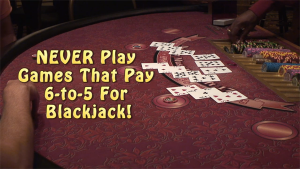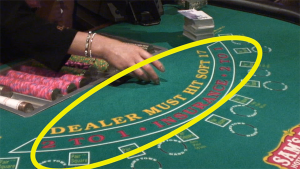by John Grochowski
In the last few decades, blackjack has evolved into a game that’s a little tougher to beat than it once was.
To give a nod to the toughest rule of all, players should avoid games where blackjacks pay 6-5 instead of 3-2. That tacks 1.4 percent onto the house edge and serves as a signal to informed players to look for another place to play.

You should avoid games that only pay 6-to-5 for blackjack!
That’s something to watch out for at a minority of tables. More widespread is a huge increase in “dealer hits soft 17” games.
Once found mostly at single-deck and two-deck tables, hit soft 17 games have become the standard even with six decks in play. In some markets, you can’t find a table where the dealer stands on all 17s with minimum bets of less than $25.
The most common game has become six decks, dealer hits soft 17.

It will be noted on the blackjack table if the dealer hits soft 17
Hitting soft 17 adds about two-tenths of a percent (0.20%) to the house edge. Dealers bust more often when they hit soft 17 since they are hitting hands they’d stand on given different rules.
That positive for players is outweighed by dealers getting the chance to improve on 17 without busting on the next card. Seventeen is not a winning hand unless players bust. If players make standing hands, the best a dealer 17 can do is push a player 17.
Strategy Changes For Soft 17 Hands
On most hands, the rules difference doesn’t affect players’ basic strategy. However, if you’ve learned basic strategy for stand on all 17s games, there are minor adjustments to be made.
Two soft hands are played differently depending on whether the dealer hits soft 17. In addition, there are a couple of surrender plays that are different, should you land at the rare table where surrender is offered.
Assume a common multi-deck game in looking over these strategy variations. They apply to games from four to eight decks. Statistics given are for six-deck games.
**Soft 18 vs. Dealer’s 2: Double down if permitted instead of standing.
This is a close call regardless of dealer rules, but hit soft 17 games push the hand to the profitable side of the double down line. Players want to take advantage of the dealer’s increased chances of busting even though overall, the hand is more profitable for players if the dealer stands on all 17s.
If the dealer hits soft 17, then with Ace-7 vs. 2, your average profit is 11.6 cents per dollar of your original wager if you double down, and slightly less at 11.3 cents if you stand.
If the dealer stands on soft 17, the hand falls on the other side of the border. Then, your average profit of 12.1 cents per dollar of your original wager if you double is less than the 12.4 cents if you stand.
You don’t want to hit soft 18 vs. 2 in either scenario. Average profits are 6.0 cents if the dealer hits soft 17, 6.3 cents if he stands.
Note that the change brings strategy for soft 18 vs. 2 into line for that vs. a dealer’s 3, 4, 5 and 6. In all those hands, basic strategy is to double on soft 18 if permitted.

A blackjack strategy chart will help you play your hands properly
**Soft 19 vs. Dealer’s 6: Double down instead of standing.
The dealer will have an Ace down for soft 17 fairly often at about 7.7 percent of the time. Here again, the increased chance of the dealer busting leads to doubling down being a better option than standing even though overall, the hand is less profitable than when the dealer stands on all 17s.
When the dealer hits soft 17 and you have Ace-8 vs. 6, the average profit per dollar of your original wager is 46.2 cents if you double down. That’s marginally better than the 45.2 cents if you stand. The weakest play is to hit, with an average profit of 23.1 cents per dollar.
In games where the dealer stands on all 17s, standing brings an average profit of 49.4 cents per dollar, while doubling down is slightly weaker at 48.0 cents. Hit, and the profit is only 24.0 cents per dollar.
On a basic strategy chart for stand on all 17s games, you’ll see a solid “stand” line for soft 19 against all dealer up cards. But on hit soft 17 charts, you’ll see stand for everything but a dealer’s 6, in which case you double on soft 19 when permitted and stand when not.
Strategy Changes For Surrender With Soft 17 Hands
Not many tables offer surrender nowadays. Should you encounter it, you tell the dealer you surrender after you see your first two cards and the dealer up card. Then the dealer takes half the bet – you surrender half your bet in exchange for not playing out the hand and risking loss of the whole bet.

Some casinos will allow you to surrender when the dealer is showing an Ace
Basic strategy when the dealer stands on all 17s calls for you to surrender in four situations: hard 15 against a dealer’s 10 and hard 16 against a dealer’s 9, 10 or Ace. Hard 16 does not include 8-8. Instead of surrendering, you split the pair.
When the dealer hits soft 17, basic strategy calls for surrender in three more situations: Hard 15 against an Ace; hard 17 against an Ace and 8-8 against an Ace.
Whenever you surrender, you lose 50 cents per dollar wagered. In all surrender situations, you lose more than 50 cents per dollar if you play out the hand.
There are multiple ways to make hard 15, 16 or 16 – some with two cards, some with three or more. Let’s look at a few two-card examples.
**With 8-7 vs. Ace, the average loss when hitting is 47.6 cents per dollar if the dealer stands on soft 17 or 50.3 cents if he hits. With a 50-cent loss as a dividing line, basic strategy is to hit in stand on all 17s games and surrender in the others.
**With 9-8 vs. Ace, your average loss when standing on hard 17 is 47.4 cents. But if the dealer hits soft 17, the average loss when standing climbs to 51.2 cents, so you surrender.
**With 8-8 vs. Ace, the average loss when splitting is 36.4 cents per dollar of your original wager. But when the dealer hits soft 17, that chance to improve on 17 looms large and your average loss when splitting soars to 51.4 cents. So given the chance, you surrender.
Many players will never get a chance to apply those surrender strategies. The rule isn’t widespread.
But the other two plays, the soft doubles, are situations you’ll encounter often. Dealer hits soft 17 is the most common situation at today’s tables. If you’re going to learn basic strategy only one way, then the hit soft 17 version is the most practical.
John Grochowski has been covering casinos and casino games for nearly 40 years. He is the author of six books and his work appears in newspapers, magazines and websites around the world.
Try an online casino for FREE! Use any of our great No Deposit Bonus Codes. No credit card needed, just sign up and start playing!


Years ago standing on soft 17 was the norm. Last time I looked (in Vegas) I didn’t see anyplace where the dealer stood on soft 17. Can you name some places where it is still done?
Thanks
You can find lots of casinos on the Las Vegas Strip that will stand on soft 17. However, it will only be offered on games where the table minimums are higher. Usually $50 or $100 minimum bets are required.
Sometimes you can find games where the dealer stands on soft 17 on the virtual blackjack machines. Since the casinos don’t have to pay a dealer they can be a bit more liberal with their rules in favor of the player. Not all casinos will do this, but some do offer it.
That explains why I haven’t seen any! :)
My casino in Pittsburgh stays on soft 17 and allows surrender.